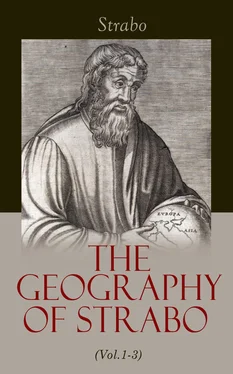“The shame
That must attend us, after absence long
Returning unsuccessful, who can bear?” 1102
In the same way is related the wandering of Æneas, of Antenor, and of the Heneti; likewise of Diomedes, of Menelaus, of Ulysses, 1103and of many others. Hence the poet, knowing of similar expeditions to the extremities of Iberia, and having heard of its wealth and other excellencies, (which the Phœnicians had made known,) feigned this to be the region of the Blessed, and the Plain of Elysium, where Proteus informs Menelaus that he is to depart to:
“But far hence the gods
Will send thee to Elysium, and the earth’s
Extremest bounds; there Rhadamanthus dwells,
The golden-haired, and there the human kind
Enjoy the easiest life; no snow is there,
No biting winter, and no drenching shower,
But zephyr always gently from the sea
Breathes on them to refresh the happy race.” 1104
Now the purity of the air, and the gentle breathing of the zephyr, are both applicable to this country, as well as the softness of the climate, its position in the west, and its place at the extremities of the earth, where, as we have said, he feigned that Hades was. By coupling Rhadamanthus with it, he signifies that the place was near to Minos, of whom he says,
“There saw I Minos, offspring famed of Jove;
His golden sceptre in his hand, he sat
Judge of the dead.” 1105
Similar to these are the fables related by later poets; such, for instance, as the expeditions after the oxen of Geryon, and the [Pg 226]
[CAS. 150] golden apples of the Hesperides, the Islands of the Blessed 1106they speak of, which we know are still pointed out to us not far distant from the extremities of Maurusia, and opposite to Gades.
14. I repeat that the Phœnicians were the discoverers [of these countries], for they possessed the better part of Iberia and Libya before the time of Homer, and continued masters of those places until their empire was overthrown by the Romans. This also is an evidence of the wealth of Iberia: in the expedition of the Carthaginians under Barcas, 1107they found, according to historians, that the people of Turdetania used silver goblets 1108and casks. One might guess too that it was on account of this great opulence that the men of the country, and their chiefs in particular, were styled long-lived. Wherefore Anacreon thus sings,
“Neither would I desire the horn of Amalthea, nor to reign over Tartessus one hundred and fifty years.”
Herodotus too has preserved the name of the king, whom he calls Arganthonius. 1109The passage of Anacreon must therefore either be understood [of this king], or some other like him; or else more generally thus, “nor to reign for a lengthened period in Tartessus.” Some writers 1110are of opinion that Tartessus is the present Carteia.
15. The Turdetani not only enjoy a salubrious climate but their manners are polished and urbane, as also are those of the people of Keltica, by reason of their vicinity [to the Turdetani], or, according to Polybius, on account of their being of the same stock, but not to so great a degree, for they live for the most part scattered in villages. The Turdetani, on the other hand, especially those who dwell about the Guadalquiver, 1111have so entirely adopted the Roman mode of life, as even to have forgotten their own language. They have for the most part become Latins, 1112and received Roman colonists; so that a short time only is wanted before they will be all Romans. The very names of many of the towns at present, such as Pax Augusta 1113amongst the Keltici, Augusta-Emerita 1114amongst the Turduli, Cæsar-Augusta 1115amongst the Keltiberians and certain other colonies, are proof of the change of manners I have spoken of. Those of the Iberians who adopt these new modes of life are styled togati . Amongst their number are the Keltiberians, who formerly were regarded as the most uncivilized of them all. So much for these.
Table of Contents
1. Starting again from the Sacred Promontory, 1116and continuing along the other side of the coast, we come to the gulf near the Tagus, afterwards Cape Barbarium, 1117and near to this the outlets of the Tagus, which may be reached by sailing in a straight course for a distance of 10 stadia. 1118Here are estuaries, one of them more than 400 stadia from the said tower, on a part of which Laccæa is situated. 1119The breadth of the mouth of the Tagus is about 20 stadia, its depth is so great as to be capable of navigation by vessels of the greatest burden. At the flood-tide the Tagus forms two estuaries in the [Pg 228] [CAS. 152] plains which lie above it, so that the plain is inundated and rendered navigable for a distance of 150 stadia. In the upper estuary an island is formed about 30 stadia in length, and nearly equal in breadth, which is fertile, and has excellent vines. The island lies near to Moro, 1120a city happily situated on a mountain close to the river, and about 500 stadia from the sea. The country surrounding it is very fine, and the ascent [of the Tagus] for a considerable way practicable for vessels of a large size, the remainder is performed in river-boats. Above Moro it is navigable for a yet longer distance. Brutus, surnamed the Gallician, made use of this city as a military station, when fighting against the Lusitanians, whom he subdued. On the sides of the river he fortified Olysipo, in order that the passage up the river and the carriage of necessaries might be preserved unimpeded. These therefore are the finest cities near the Tagus. The river contains much fish, and is full of oysters. It takes its rise amongst the Keltiberians, and flows through the [country of the] Vettones, Carpetani, and Lusitani, towards the west; 1121to a certain distance it runs parallel with the Guadiana 1122and Guadalquiver, 1123but parts from them as they decline towards the southern coast.
2. Of those who dwell above the aforesaid mountains, the Oretani are the most southern, extending in part as far as the sea-coast on this side the Pillars. Next these towards the north are the Carpetani, then the Vettones and Vaccæi, through whose [country] the Douro 1124flows as it passes Acontia, 1125a city of the Vaccæi. The Gallicians are the last, and inhabit for the most part a mountainous country: on this account they were the most difficult to subdue, and furnished his surname to the conqueror of the Lusitanians; in fact, at the present day the greater part of the Lusitanians are beginning to call themselves Gallicians. The finest cities of Oretania are Castulo 1126and Oria. 1127
3. North of the Tagus is Lusitania, the principal of the nations of Iberia, and the one which has most frequently encountered the arms of the Romans. On the southern side this country is bounded by the Tagus, on the west and north by the ocean, on the east by the well-known nations of the Carpetani, the Vettones, the Vaccæi, the Gallicians, and by others not worthy to be mentioned on account of their insignificance and obscurity. On the other hand, certain historians of the present day give the name of Lusitanians to all of these nations.
To the east the Gallicians border on the nation of the Asturians and Keltiberians, the others [border] on the Keltiberians. In length Lusitania is 3000 1128stadia; its breadth, which is comprised between the eastern side and the opposite sea-coast, is much less. The eastern part is mountainous and rugged, while the country beyond, as far as the sea, consists entirely of plains, with the exception of a few inconsiderable mountains. On this account Posidonius remarks that Aristotle was not correct in supposing that the ebb and flow of the tide was occasioned by the sea-coast of Iberia and Maurusia. 1129For Aristotle asserted that the tides of the sea were caused by the extremities of the land being mountainous and rugged, and therefore both receiving the wave violently and also casting it back. Whereas Posidonius truly remarks that they are for the most part low and sandy.
Читать дальше












![Anne Blunt - A Pilgrimage to Nejd, the Cradle of the Arab Race. Vol. 2 [of 2]](/books/750183/anne-blunt-a-pilgrimage-to-nejd-the-cradle-of-the-thumb.webp)